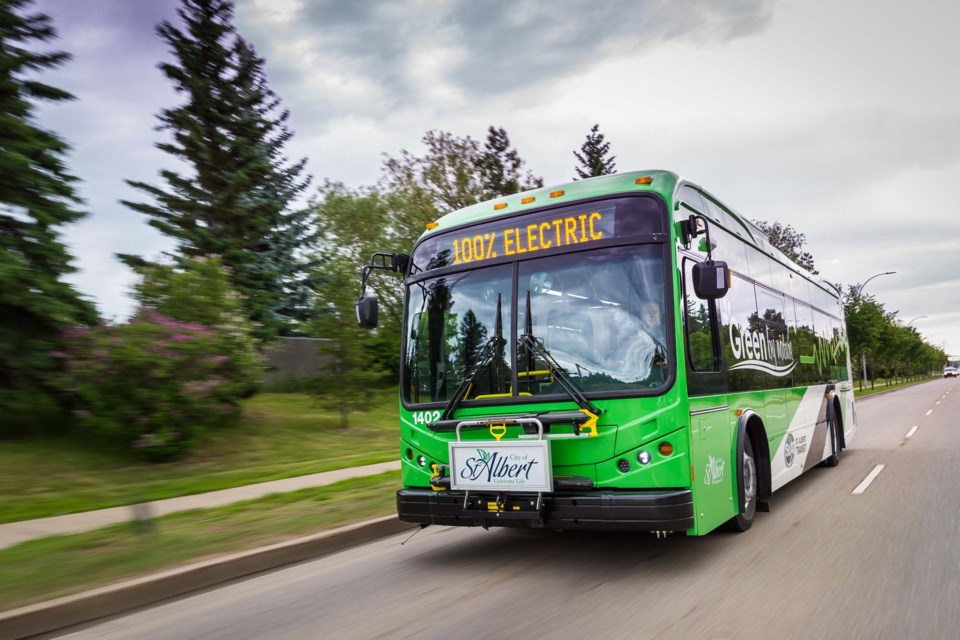St. Albert’s electric bus fleet has just won one of Alberta’s highest environmental honours.
The City of St. Albert received an Emerald Award June 2 for having the first fleet of long-range electrical buses in Canada.
The Emerald Awards are considered by many to be Alberta’s most prestigious environmental award. Administered by the Alberta Emerald Foundation, the awards recognize up to 12 people or organizations a year for their inspirational work on ecological issues. While it’s usually a trophy, this year’s award consists of a certificate and a $2,000 grant.
St. Albert was the first municipality to adopt electric buses as the standard for their transit system, said foundation executive director Gregory Caswell.
“That shows strong leadership not only within our province but within our country,” he said, and should encourage other communities to follow suit.
“If St. Albert is able to do it, why can’t other communities do it?”
This is the second Emerald Award ever received by a St. Albert organization – the Big Lake Environment Support Society got the other one in 1996.
“We are so pleased to be recognized for our electric buses that we are so very proud of,” said St. Albert Mayor Cathy Heron.
St. Albert’s electric buses were previously recognized with a Minister’s Award for Transportation Innovation in 2018.
Road to electric
St. Albert became the first place in Canada with an electric bus on a regular transit route in 2017. The city now has seven such buses in its fleet, with four more on order, and plans to eventually make all its buses electric.
“We’ve got an environmentally conscious city,” Heron said of the purchase, and having a zero-emission bus fleet makes sense.
St. Albert first experimented with electric buses in 2014 and 2015. The trial runs showed that the buses work in St. Albert’s climate and are cheaper over their lifetime than their diesel counterparts – $632,325 cheaper once you factored in government grants. The buses also produce less noise, half as many greenhouse gas emissions, and 100 per cent less tailpipe emissions than diesel.
The city made these green buses even greener in 2017 when it installed 250 kilowatts of solar panels on the roof of the Campbell Park transit garage. The panels provide about 20 per cent of the building’s power use, preventing some 180 tonnes of greenhouse gas emissions a year.
Operators have found that the electric buses are easier to drive than diesel ones, as they have power steering, air conditioning and better acceleration, city spokesperson Cory Sinclair said in an email. They also cost about 47 per cent less per kilometre to maintain and fuel, and have so far saved the city about $123,000 in energy costs.
They do have downsides, Sinclair continued: less range, for one, and a fuel price that can bounce between nine and 56 cents per kilowatt hour, depending on when in the day you charge them. They also cost a lot more up front, which could force the city to buy a few diesels in the future if budgets are tight.
As of June 2020, St. Albert was the only place in the Edmonton region that has electric buses on the road as part of its regular fleet. Edmonton is expected to field about 40 this fall.
Heron said St. Albert took a calculated risk when it bought these electric buses, but they’ve proven their worth as an investment.
“They’re really paid off for St. Albert,” she said, and she encouraged others to follow the city’s lead.
Sinclair said the city would use its Emerald Award grant for a yet-to-be-determined environmental initiative.




